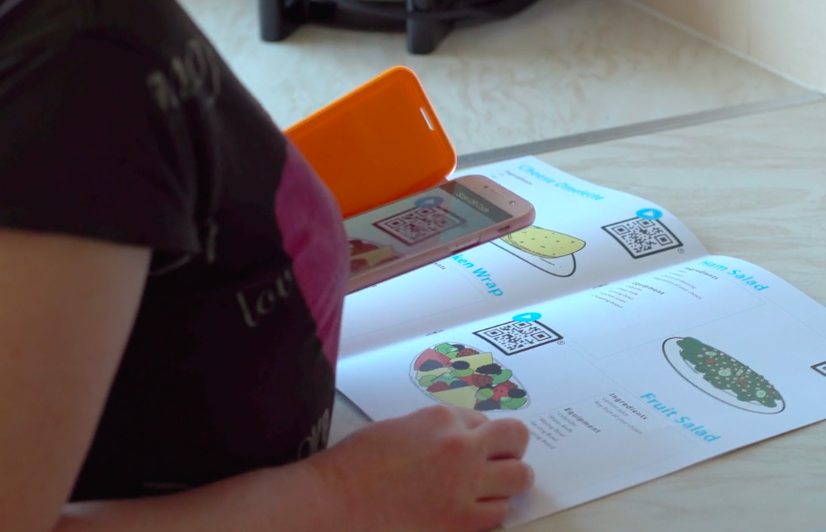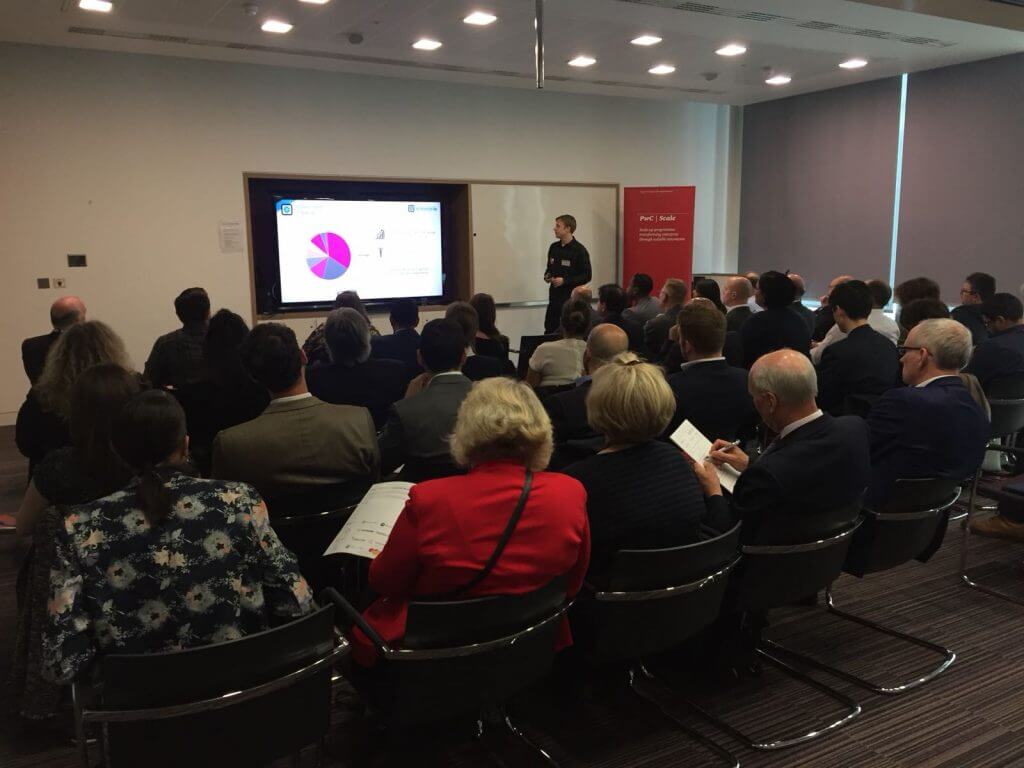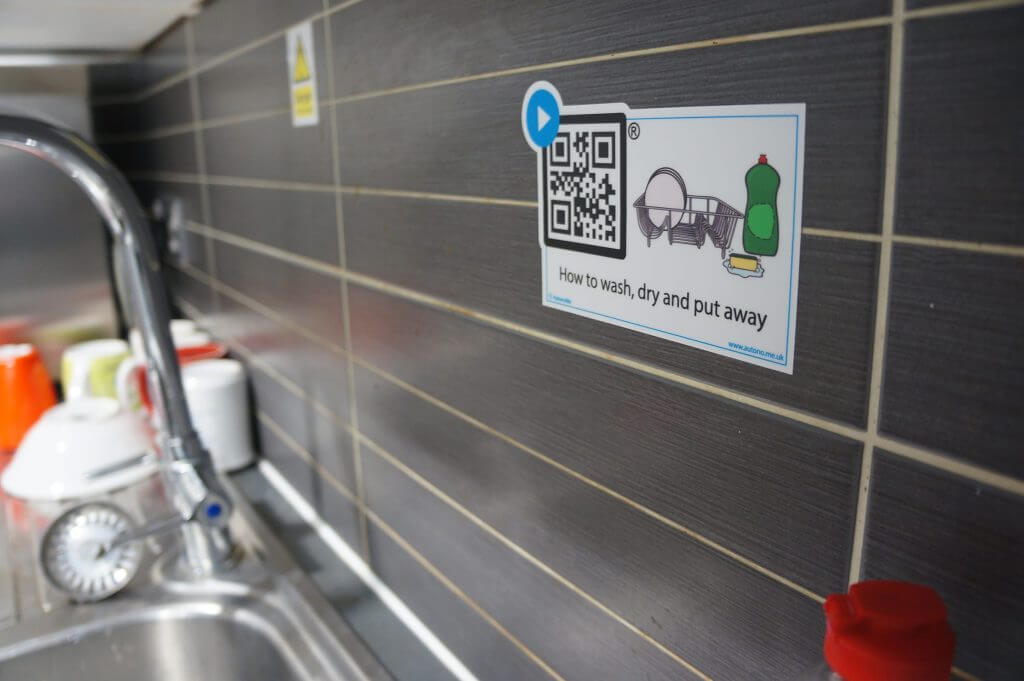AutonoMe is a Bristol-based tech startup that helps people with learning disabilities to live independent lives. They recently partnered with us to produce their new app, so we caught up with founder William Britton to find out how he grew a simple idea into a successful startup.
AutonoMe‘s users scan QR codes placed around the home with their phones to access videos that show them how to complete everyday tasks. These range from making a cup of tea to using the washing machine.
We’re big fans of AutonoMe’s concept and have partnered with them to produce a full-featured version of their MVP app, which hosts all their videos in a single place.
We spoke to William about how he refined his ideas, secured funding and built a prize-winning company with no business experience.
Can you tell me a bit about your background?
Ten years ago I was working in the video production industry. To make ends meet, I started a temp job at the local college, supporting students with learning disabilities. I loved the job so much I ended up dropping all my video production work and focused my career on people with learning disabilities.
I spent a number of years as a learning disability lecturer, teaching IT, Media and Graphics. As I knew a bit about technology, they made me the assistive technology specialist.
It was a nice time for assistive technology – no-one knew what to do with it but they gave me a small budget because they knew it was going to be ‘the next big thing’. I started to film my students doing projects and realised video was a much better way of communicating than through written text.
I would film instructions for my students on how to complete their work rather than having them read stuff – a lot of them couldn’t read or really struggled with it so why highlight their difficulty?
At a workshop, I came up with the idea of linking QR codes to the videos I made for my students and created a prototype to see if it would work. People were telling me ‘that’s such an amazing idea, you should make it available to everyone’. Four years later, here I am.
‘My aim is to get the tech into the hands of those that could benefit the most.’
How does the technology work?
The idea is that if a person with learning disabilities doesn’t know how to do something, they can scan an item and a video will explain – in a really inclusive, accessible way – how to work though that task. Say I didn’t know how to hoover my house, I could point my phone at the hoover and follow the steps in the video.
The problem is that we take for granted how fast we learn things. Within two or three goes, you or I could cook up a nice chicken curry – but people with cognitive disabilities may need longer to learn things. So the core principle of our platform is that it’s a teaching tool available around the clock, available when and wherever they need it.
The videos should ultimately help users need less support over time, but it’s different for each person. They may go from needing loads of support to needing less with the video support, or they may go from needing loads of support to not needing the videos at all any longer.
It’s just a way of facilitating people becoming as independent as possible.
What gave you the idea to turn this into a business?
My end goal has always been to create the high-quality, financially sustainable technology for people with learning disabilities – and to have as many people as possible using it. I want to get it into the hands of those that will benefit from it the most.
One of the things that annoyed me as an assistive technology specialist was that the good technology on the market was often either provided by a charity or a funded project. But charity revenue streams are unreliable and companies might go bust, while R&D grants have no longevity. I would set my students up with some kind of app or software that would help them and then the company would become defunct or the project would run out of money.
I wanted to create a technology good enough that people would buy it and it would sustain itself, so it would always be there for the users.
Some people might need our support for a few months, others their whole life – so we need to be there for them.
‘I was quietly confident from my teaching that videos were the best medium, and over time we’ve been proven right.’
How did you get the business off the ground?
I didn’t know anything about running a business! Also, I’m really bad at applying for grants. I’m much better at standing in front of someone and telling them about my ideas.
My original model was completely bespoke. I used to go in and film new video content for each organisation but I soon realised that people wanted the same videos around household activities. And because filming is so labour intensive I had to charge quite a high price.
So I thought ‘why don’t I premake some videos and make them available with every purchase of bespoke videos?’ so people would get better value.
I also noticed that most people with learning disabilities didn’t need bespoke videos – users could follow my pre-made content so long as it was inclusive, good-quality and highlighted their strengths rather than their weaknesses. This is something that’s incredibly hard to achieve without knowing about the challenges people with learning disabilities face.
We’ve now expanded our library to over 100 videos and work with our clients and service users to choose what videos we should create next.

How did you test your ideas?
I was quietly confident from my teaching that videos were the best medium, and over time we’ve been proven right. We had focus groups quite early on and I did a lot of presentations to parent-carer groups.
Our focus group has expanded over time and we have a strong partnership with the local college I used to teach at, so when we’re making improvements we invite all their students over for the day and have them evaluate our designs.
We look at how people are using the system, what they’re struggling with and what they’re hoping to get out of it and make adjustments as we go along. We have a good chunk of users giving us regular feedback as well.
‘[Having] the board allowed me to look up from the detail at the bigger picture, so it was a good decision for me.’
How does AutonoMe make money?
We licence AutonoMe to local authorities who buy on behalf of their learning disability population. We work with the users to assess their needs and see if they have a smart device. Luckily most do and smart device adoption is growing.
What we’re building is a support provider that delivers a service through a technology platform. The idea is to be recognised as a national provider, not an app – the app is a means to an end. So we need to be very clear about where we sit in the market and what we offer.
Historically, technology companies in the learning disability space have been quite hands off – selling their product and then moving on. AutonoMe is different – we want to know who each person is, how they’re getting on and developing their independence.
We want people to value the technology and benefit from it long-term. We want to be a part of their community.
How did you approach investment?
I used to sell just the video content but over time I wanted to expand into different areas of the market. I had a couple of potential clients that, unless I had more money, I couldn’t have served. There were things I wanted to do but couldn’t because of lack of funds.
I was hoping we’d be an attractive investment prospect as we had knowledge, market traction, a product people were paying for, successful case studies and bigger clients waiting to work with us. We were in an attractive tax bracket for investment as a new company, so we took advantage of that as well.
We presented our reasoning and where we wanted to go as a company and that went quite well the first time, so we went back in again recently for a second round.
That second round in March and helped us expand the core team and explore new ways of selling the product. We’re really keen on developing our platform further to measure people’s cognitive ability – because we’re a technology platform we can do it on quite a large scale.
So we started improving our data platform, which now measures people’s independence against the videos. We might open the data up to academia – there are all sorts of possibilities.
‘We saw that CookiesHQ got involved with companies with a social impact […] it justified our feeling that you’d be a good choice.’
Why did you choose to set up a board?
I didn’t even know incubators and boards existed! I joined SETsquared after about a year of running the company. We were unusual in that we already had people paying for the technology and a defined market. It just needed a lot of refining.
SETsquared’s workshops were really beneficial because what I learned helped me grow the company. One of the workshops was about the importance of establishing a board and the legal responsibilities involved, so I thought ‘yeah, I need a board’!
Through networking events I found a mentor who could advise on the tech side and when I won a prize through UnLTD they set me up with another mentor who had loads of experience running companies. So they both joined the board, and then I brought in a friend who I’ve worked with for years and she a great deal of experience of our industry. And that’s the core makeup at the moment.
Having a board benefitted me because I was on my own before. I was making and selling the product – doing everything. The board allowed me to look up from the detail at the bigger picture, so it was a good decision for me.

Why have you partnered with CookiesHQ for your app development?
We always knew we’d need some help with the app – it’s an acceleration issue because it could take us 6 months to do it ourselves or we can outsource it and it will be much quicker.
So we sat down as a company and worked out what we can do, what we can’t do and how to speed things up, but within our budget. And then we looked at companies that could offer what we needed and we saw that you guys get involved with companies with a social impact. Then one of our board members recommended you and it all justified our feeling that you’d be a good choice.
‘Spend time working on your communication skills and it will pay dividends.’
What tips would you give a new founder?
Communication is key – if you can’t communicate your ideas in a way people can digest or understand then you don’t have a business. You’ll need to communicate with your clients, staff, suppliers, investors, mentors, board all the time. Spend time working on this skill and it will pay dividends.
You’ll be poor as hell for a long time – accepting that is wise! You’ll also question yourself a lot, so be clear about who you are and what you’re trying to achieve. If you fail initially, it might not be because your idea is bad – it could be the market just isn’t right.
And get good people around you. We’re only reasonably successful because we have a great team and everyone works really hard. Get in good people who can see what you’re trying to build and make sure they share your vision.
Find out how CookiesHQ has helped other organisations reach their goals.
